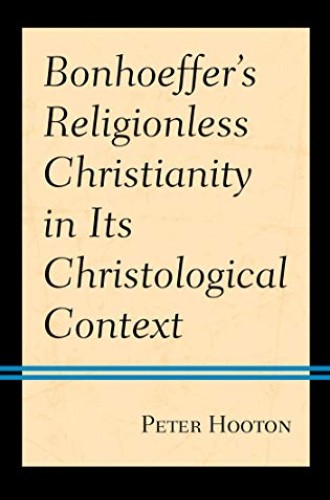In a secular age, Bonhoeffer’s “religionless Christianity” is evergreen
Peter Hooten considers the concept in relationship to the theologian’s entire body of work.
Many theologians have gestured toward Bonhoeffer’s late reflections on religionless Christianity, and for good reason. In a secular age, the phrase is evergreen—and it’s all the more winsome because it was coined in the prison letters of an ascendant anti-fascist martyr theologian. The concept is almost endlessly generative. Even if more is made of it than is warranted, or even if those using it take it in directions Bonhoeffer might not have endorsed, many of those directions bear fruit.
Peter Hooton’s gift to students of Bonhoeffer is a full-length programmatic consideration of Bonhoeffer’s notion of religionless Christianity. It’s programmatic not only because it is a book-length meditation on the topic but because Hooton considers the concept genealogically in relationship to Bonhoeffer’s oeuvre. He is committed to treating religionless Christianity as a “fully functional theology, rather than as fragment, or historical artifact.”
In religionless Christianity, Hooton explains,
a genuine existentialism (a thoroughly worldly life of constant decision, risk, responsibility, and uncertainty) is held in dialectical tension with a genuine Other (a real outside), while the power of Christ’s freeing and redeeming love unlocks a larger life of constant and profound fellowship with Jesus Christ. His death and resurrection do not point to new life in some other place but rather to a new way of living—of “being for others”—in this, now post-religious, one.
This “being for others” is significant in Bonhoeffer’s thought as he envisions the world coming of age.
Because he was murdered by the Nazis in 1945, Bonhoeffer did not have the opportunity to see the world develop in the latter part of the 20th century. There was a somewhat post-religious and secularizing development in Europe and other parts of the West, with a simultaneous rise of religiosity taking place over the rest of the planet. For this reason, Hooton analyzes the secularization hypothesis (the idea that religion fades away as societies progress), clearing the air a bit and placing Bonhoeffer’s concept of religionless Christianity in contemporary context.
Beyond this, we might ask: What is Bonhoeffer’s definition of religion? For Bonhoeffer, religion is the human quest for God. It’s distinct from grace, which is God’s gift to human beings. The directionality of religion matters not so much for doctrinal reasons but instead because of the operational difference it makes in the life of the believer.
Religion has us busy doing things for God (perhaps especially in the institutional church). Religionlessness reflects the freedom of God in being for others and of Jesus as the “human being for others.” The pursuit of God, then, is not transcendence as typically understood, “not the infinite, unattainable tasks, but the neighbor within reach in any given situation.”
In August of 1944, Bonhoeffer sent his friend Eberhard Bethge his “Outline for a Book.” In this outline, he suggested that
the interpretation of biblical concepts . . . (Creation, fall, reconciliation, repentance, faith vita nova, last things) should reflect a new understanding of the human experience of transcendence, which is the experience of “being there for others,” through participation in the being of Jesus.
Another way to put it is this way: religionless Christianity is not for freedom from institutions. It’s for the neighbor and her needs.
Religionless Christianity is, in a sense, the church come of age. Hooton explains:
The church, too, which is “nothing but that piece of humanity where Christ really has taken form,” is, or should be, concerned only with human wholeness. Indeed, the church is the epitome of such wholeness—the apotheosis of the God-reconciled human being roused to new life in Christ. As such, its principal concern must be “with existence in the world of human beings in all their relationships,” rather than with life’s fragmentary religious functions and expressions.
A great strength of Hooton’s analysis is the way he shows connections from the beginning to the end of Bonhoeffer’s works. For example, in an early sermon on 2 Corinthians 12:9 (“my strength is made perfect in weakness”) preached in London, Bonhoeffer asks, “What does it mean to be physically or mentally or morally weak in the world?” In the sermon, Bonhoeffer assumes that many give this issue little thought and would prefer not to think about it, even though it is central as an example of our dependence on others. By 1944, in the prison letters, Bonhoeffer was still mulling the topic of weakness and Christianity.
By examining concepts introduced in his late prison letters and connecting the dots back throughout Bonhoeffer’s writings, Hooten demonstrates that they were not the late and suddenly clear thoughts of a theologian nearing his end but rather the culmination of much that had gone before. Tragically, Bonhoeffer did not have the opportunity to flesh them out with greater detail.
In Bonhoeffer’s religionless Christianity, faith and life dwell together comfortably. Jesus is not the portal to some other world. He is the essence of life in this one. Christians find themselves not in the presence of the imagined God of religion but instead wholly in the presence of the God of the gospel, whose crucifixion attests, as nothing else could, to God’s selfless love for human beings. As Hooton puts it,
Christians now ask not what more God can do for them, but what they can do for God, because they take seriously “the suffering of God in the world.” They know that they have, like Christ, “to drink the cup of earthly life to the last drop.” For them, life in the Christ-reality is a fully responsible, compassionate, exceptionless sharing in the pains—as well as the delights—of fine creaturely existence.
This article was edited on July 23, 2021, to correct the date of Bonhoeffer's death.






